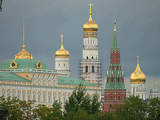Russian Liberals Split
2009
By Diyar Autal for ISN
The liberal Russian pro-reform and pro-democracy party, Union of Right Forces (external page SPS), disbanded and joined two other parties loyal to Kremlin to form a new party on 15 November. The majority of delegates of arguably the only genuine opposition party voted in favor of the party's dissolution after a long and divisive session.
The Union of Right Forces was the most contentious critical opponent of Vladimir Putin's regime. It was associated with free market reforms, privatization and the legacy of the "Young Reformers" of the 1990s. In coalition with other opposition groups, its leaders organized protest marches in Moscow and St Petersburg, criticizing the regime for reversing the country's course and moving towards its authoritarian past.
The decision to dissolve the party is a culmination of a long-running debate among members regarding its future.
The Union of Right Forces was established in 1999 and won 8.6 percent of the vote and 32 seats in the Russian State Duma (the lower house of parliament) the same year. The party, at the time led by former deputy prime minister Boris Nemtsov, strongly opposed what it viewed as the authoritarian policies of Putin, and argued that political and media freedom in Russia had been curtailed.
In the 2003 and 2007 elections, the party failed to cross the 7 percent threshold necessary for parliamentary representation.
After the 2007 parliamentary elections, efforts were made to merge various pro-democracy groups into one party, but none were successful. On 1 October this year, the SPS external page announcedits possible dissolution and the consideration of a merger with Civil Power and the Democratic Party of Russia in order to form a new liberal-democratic party: The Right Cause.
Speaking at the party council, former leader Nemtsov called on the delegates to vote against the dissolution and promised to resume leadership and find necessary funding. The party was financially battered by the failed election campaign of 2007.
After the dissolution, in an external page interview with Deutsche Welle, Nemtsov said the last independent political party in Russia had been destroyed by its own members. "In my opinion, participating in the new Kremlin party, The Right Cause, would be a huge human and ideological mistake. It would be a human mistake because people would condemn themselves to a status of political puppets, and it would be an ideological mistake because democratic parties that espouse liberal ideas have nothing in common with the Kremlin, which sets out a system of censorship, impunity and international isolation."
The Moscow and St Petersburg branches of the party also disagreed with the dissolution plans and issued statements of condemnation.
Addressing the SPS council, external page Anatoly Chubais, a key ideologist for the state privatization program in the 1990s, called on deputies to "live by the new logic" and "not to be guided by emotions" in deciding the party's fate. In support of the new Kremlin-backed party, Chubais said the real question was whether Russia should or should not have a liberal party.
Despite Nemtsov's pleas, the party council voted by an overwhelming majority to dissolve itself. The next day, delegates of the three dissolved democratic parties - the SPS, Civic Force and the external page Democratic Party - voted to establish The Right Cause with the Kremlin's blessing. Former deputy chairman of the SPS, Leonid Gozman, acknowledged the new party was being established in cooperation with the Russian president's administration.
The new political party is planning to take part in the municipal and regional elections in March 2009 and the national parliamentary elections in 2011.
Many believe the new party was promised amendments to Russian electoral legislation by President Dmitry Medvedev in his recent address to the Russian Parliament. Among other things, Medvedev external page noted that "parties that receive 5-7 percent of the votes should have guarantees of representation in Parliament."
The Russian Parliament is dominated by Putin's United Russia party, which won 64 percent of the vote in the December 2007 elections.
Critics have already charged the Kremlin with creating "virtual opposition" that will merely give an appearance of political opposition without any true influence on policy-setting in Russia's "sovereign democracy" system - so named by Vladislav Surkov, deputy chief of staff of the Russian president.
Surkov is considered by the Russian press to be the man behind the new party. He is widely believed to be the inspiration and creator of pro-government political youth movements, including Nashi ("Our People"). An advocate of "sovereign democracy," a controversial attempt to counter the promotion of democracy and human rights by the West, Surkov has no history to indicate a genuine concern for the future of liberal parties in Russia.
The Kremlin will most likely let The Right Cause take a modest share of the vote in the next parliamentary elections and win modest representation. The Kremlin, it seems, has created a new liberal party that will represent the interests of liberal voters, but, at the same time, not be vociferously critical of the regime.
